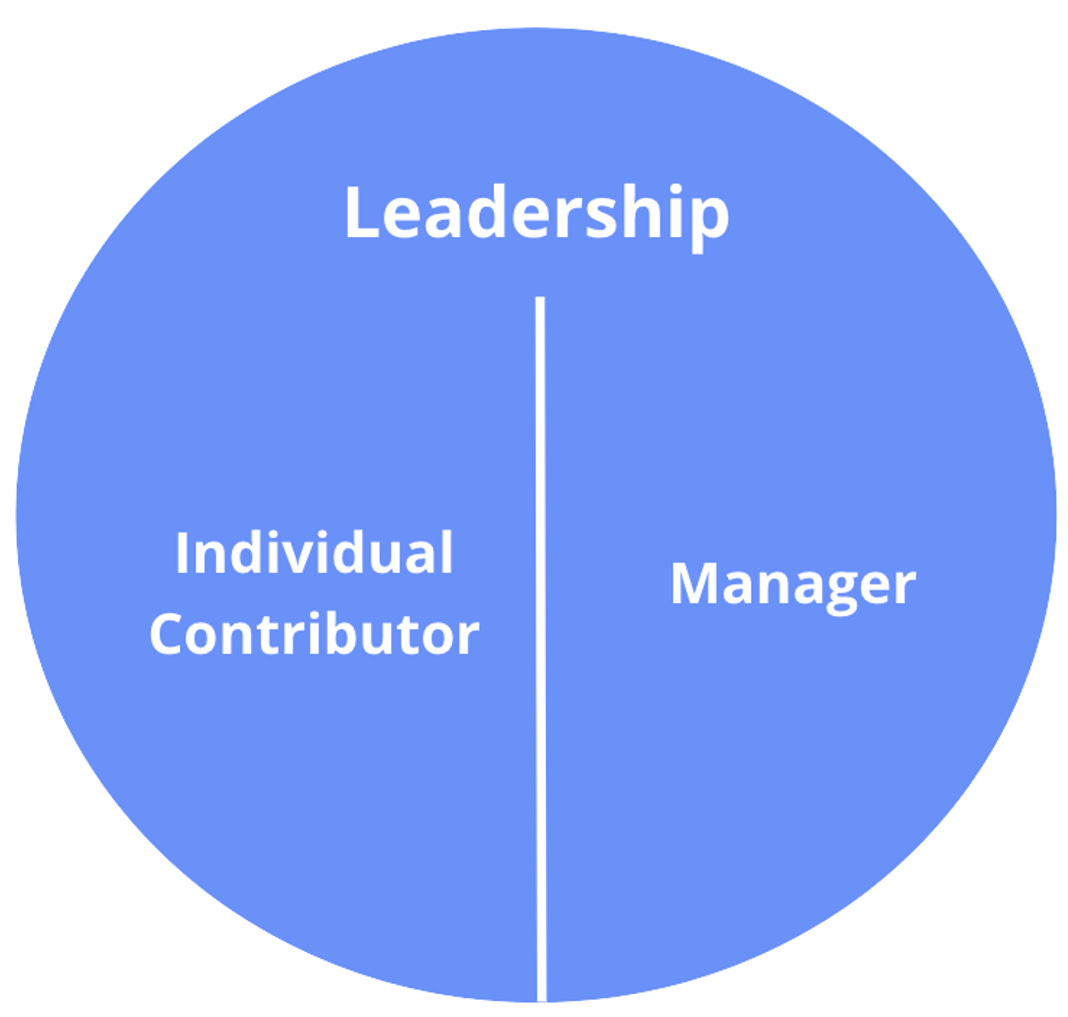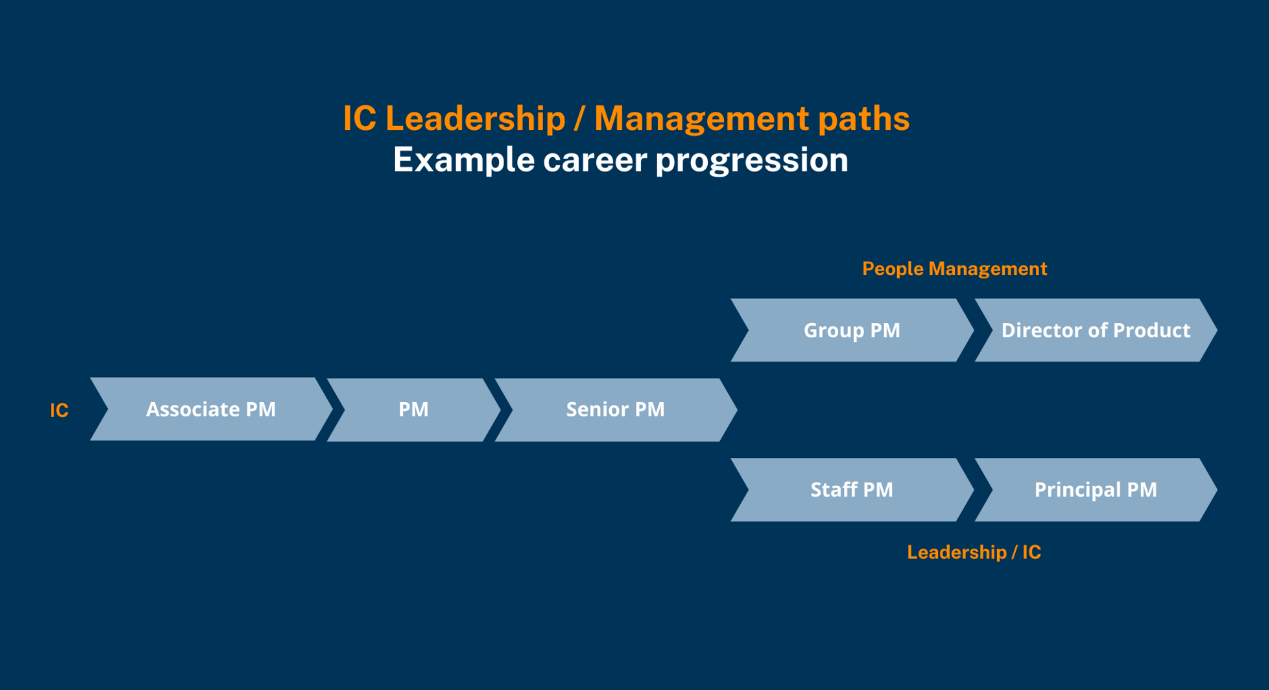Normalize Individual contributor Leadership
It's enough. We have to change this culture of people management equals seniority
The unhealthy obsession with manager-centric leadership roles
They are presented to us as the only successful career path that we have to conform to. As a result, many terrible managers are born, bringing pain and suffering to everyone involved. Because what made you good as Individual Contributor (IC) does not translate to being a great manager. Careers should not be this linear.
Why is everyone gunning for managerial leadership roles?
There is the perception of a higher financial upside. Nobody wants to limit their compensation options, and people management comes with a higher paycheck, right?
Wrong. Here is the secret you may not know: if your company uses 3rd party salary bands (say, Radford) to guide compensation standards, the 90th percentile of the highest level IC salary is higher than the 50th percentile of the Director. Or even VP.We equate people management with strategy ownership. Having a say in a company’s strategy is very satisfying, giving one direct link to observable impact. But unfortunately, the skills required to be an excellent manager vs. a visionary strategist couldn’t be further apart. Smashing them together in a singular role sets up most people for failure.
Has anybody done it right at scale? Yes. Engineering. They’ve standardized Principle/Staff engineering roles, which are leadership IC positions, that enjoy not only high financial upside, direct impact on the strategy, and respect across the entire department. So why hasn’t Product/Growth hasn’t caught up yet? Let’s change that.
Let’s normalize individual contributor leadership career paths. Managing others is not the only way forward in a career.
Leadership vs. Management vs. Individual Contributor
Leadership and management are often conflated even though they are not the same. You can be a leader without having to manage people.
Leadership: A process of social influence that maximizes the efforts of others toward the achievement of a goal (Forbes)
It has nothing to do with titles, seniority, or people management.
Manager: Responsible for staffing, recruiting and training others.
It has everything to do with people's management
Individual Contributor (IC): A non-management position that performs tasks that contribute to a company's mission and objectives
It has nothing to do with titles or seniority.
So a leader can be a manager or an IC, by definition.
IC Leadership for Product & Growth
IC product roles struggle with the lack of IC career progression options, leaving them unable to double down on their strengths. Why should you step down from your operational involvement if you’re highly talented in your contributions?
Role Descriptions
What does a sample role description look like which allows going in both directions? It is important to note that no framework should be seen as absolute. For instance, a principal PM might have little management responsibility over another junior PM. That does not make the role mainly a managerial role.
The principle is that we leverage everyone’s strengths rather than force them away from them.
Let’s look at a sample description from a product manager that advances beyond their Senior Product Manager title:
Group PM/Director: Management
Hires other Product Managers on individual skill sets and team level (Identifies skill gaps within the team and ensures new team members are held accountable for those)
Designs and manages growth plans to coach other PM’s through their growth challenges
Helps individual PM’s to sync their work across teams in the entire domain.
Responsible for tooling and processes to improve communication and sharing information between the teams, not limited to product management. (UX, Data, and Customer Success Research)
Low operative involvement in other product teams to help cover skill and resource gaps.
Staff/Principal PM: Individual Contributor
Drives product vision and strategy of product domain
Company-level expert in one skill area actively mentors other guild members (other PMs) regularly on their specialty. (Workshops, lectures, etc.)
Operatively highly involved in the creation and maintenance of the product work.
Understands and executes category design.
Advisor/Contractor
Provides expert advice within the advisor’s domain expertise to inform company strategy.
Works with company leaders.
Does not own operational execution.
Does not have direct reports.
Has a contractual relationship with the company.
The role of consultants is an excellent example of an IC with a strong Leadership profile. They don’t manage anyone directly and have no direct reports, yet a lot of influence.
The product-led perspective & How to get started
If you agree that products will be more about retention since AI products are shaking up the entire acquisition game then you know that customer closeness and operative interviews with customers and prospects are not nice to have anymore.
Retention is extremely difficult to get right and doesn’t happen from a birds-eye view but with detail-specific integrations that matter for our customers.
And that one happens in the operative teams on the ground, why do we still give managers the ultimate decision and pull power when they have the least context in most companies?
It makes less and less sense. The market will move on without you. Don’t do it out of the kindness of heart, it is a competitive advantage.
How to get started:
As a leader/founder
Suppose you wonder how to bring leadership IC into the company. In that case, it makes sense to draft concrete role descriptions which aren’t too specific and then collaborate with the rest of the team to make them more applicable to your company.
Make it clear which titles are on the same level regarding responsibility and pay and that no penalty is involved in choosing the IC leadership track.
As an individual contributor
If you feel like you hit a wall in your career progression by having no other option than just managing people in your company:
Suggest a process like this in the company. Voice your wish to your manager that you would love to double down on your strengths and whether such a role could be created. It’s always good to have concrete examples in hand:
A job title and rough role description tailored to you
Tie it to concrete goals which would move you to the next level
good examples are goals that specifically underline and can be leveraged specifically by ICs vs Managers (operative goals)
Summary
We should be building career paths around people’s superpowers, not forcing them down a one-size-fits-all road
Being a great IC does not translate to being a great manager.
Individual contributor leadership career tracks are an antidote to terrible managers.
Engineering has already been doing this successfully for decades.
If not existent, the Leadership IC track can be brought into a company with sensible suggestions. Otherwise, advisor and contractor roles offer the same structure.
The mere existence of advisors and contractors is already market proof that leaders have more than enough traction to explore this change.
About the Authors
Elena Verna and her Elena's Growth Scoop
I’m the growth solopreneur making PLG dreams a reality for B2B SaaS companies. Think of me as the one-person Avengers team, doing everything from interim exec positions, advising, investing, course creation, and the most demanding position of them all - being a mom.
I’ve operated or advised companies such as Dropbox, Miro, Amplitude, SurveyMonkey, MongoDB, Netlify, Clockwise, Veed.io, Similarweb, HP, Bonusly, Browserstack, and many more. I am also a Program Creator at Reforge, creating courses for Experimentation, Monetization, Growth Leadership, and soon-to-be-released PLG. All while trying to make my own blog happen: elenaverna.substack.com 🔥
All of my downtime is consumed with my two kids and their endless soccer practices, with mandatory daily Crossfit sessions. Because deadlifting 250 pounds and seeing your traps in the mirror does wonders for female self-confidence and imposter syndrome.
Leah Tharin and herLeah’s ProducTea
Hi, my name is Leah. I spill the tea on over two decades in the industry.
I specialize in bringing product-led growth and sales-led together in B2B from the CPO’s perspective as an interim exec/growth solopreneur.
Chief Product Growth Officer @ GotPhoto.com
Portfolio Advisor to Notion Capital, a European Series A+ B2B, 300m fund
Head of product at Jua.ai, ML/AI revolutionizing weather forecasts
Core product lead at Smallpdf.com
Interim Head of Product at Deindeal.ch (pushing Groupon out of the market)
Microsoft Online Lead Switzerland
PLG & Growth advisor to a lot of companies, for instance Northone, Toggl
I have opinionated, hot takes on product leadership and management, which are first principle-driven and battle-tested.







I love this and strongly agree that what makes someone a great individual contributor does not necessarily translate to thriving (both excelling and enjoying) as a people manager.
I am curious though as to why you think many companies do not offer this dual career path. For example, do you think it is simply a misconception around the role of people management vs product management, or do you think that this problem stems more from limited resources at companies leading companies (particularly smaller ones) to structure product roles in a way that assumes that progress in product management means more people management because it is perhaps seen as more cost-effective? Would also love to see examples of companies that have implemented the dual career ladder successfully.
A very important topic and look forward to reading more!
The good thing is that product managers need to be leaders from the beginning: They can hardly build something on their own. A high proportion of their work goes into motivating others into moving into a desired direction. So product managers usually grow into leaders early on, even if they will never take on management roles.